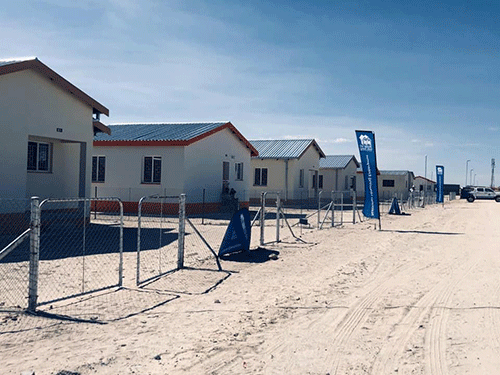The slowdown in sales activity, particularly within the small housing segment, which has historically dominated the market, presents a huge risk for the development of the housing market and economic recovery in general.
In an unusual development by historic standards, the small housing segment recorded lower-than expected sales of houses for the period under review. Sales volumes within the small housing segment posted a contraction of 0.8% year-on-year, from a growth of 7.3% year-on-year recorded in the same period of 2021.
This was stated by Frans Uusiku, FNB market research manager, in a report titled “Namibia residential property report for the second quarter of 2022”.
The FNB Residential Property Index published a 12-month average contraction of 2.8% at the end of June 2022, compared to a growth of 4.7% at the end of the prior quarter, and 9.6% over the corresponding period of 2021.
According to Uusiku, the sudden deceleration follows the onset of interest rate hikes in 2022, where the Bank of Namibia raised rates by cumulative 175 basis points over a period of seven months.
“Nonetheless, overall national house prices have remained fairly stable, with the 12-month national weighted average house price recorded at N$1 173 059 in June 2022, compared to N$1 211 382 in June 2021,” he said in the report released on Wednesday.
The contraction in house prices was observed across all regions, with the deepest contraction of 20.8% year-on-year recorded for the coastal region to N$1 253 000, followed by the southern region with -7.9% year-on-year to N$761 000, the central region with -4.0% year-on-year to N$1 564 000, and the northern region with the least contraction of 2.7% year-on-year to N$852 000 at the end of June 2022.
The Namibia Country Private Sector Diagnostic (CPSD) report launched by the World Bank in July 2022 stated that to clear the backlog of 300 000 houses over the next 10 years, more than 30 000 housing units are required per annum.
The CPSD’s objective is to identify near and medium-term reform opportunities to revitalise the private sector and help reposition Namibia’s growth on a green, resilient and inclusive trajectory.
It further recommended that Namibia must in the short-term support the finalisation and implementation of the housing strategy, drawing upon global experience, to promote sustainable urban development.
Uusiku noted that periodic access to real-time data on household income would be a critical indicator for residential market development and affordability, particularly in the post-Covid-19 economic context.
“The independent segmentation of the housing market by developers is often marred by thoughtful marketing moves that allow to influence the demand for apartments and their price. Thus, the higher the category of apartments, the greater the benefit of the developer. This approach continues to derail optimal delivery of affordable housing in our view.
This calls for a more unified segmentation approach, while also ensuring that there is periodic access to real- time data on household income to guide targeted market interventions,” stressed the researcher.
While supply-side challenges have been at the core of the housing market dynamics, waning demand on the back of a deteriorating macroeconomic environment is seemingly taking a toll on the market.
Meanwhile, the National Housing Enterprise’s (NHE) spokesperson Tuafi Shafombabi said due to a lack of serviced land and funding, they only managed to provide 896 houses since 2016. The NHE is publicly-funded, and its core business is providing housing to Namibia’s low-and middle-income earners, as well as the financing of housing for such inhabitants.
The Shack Dwellers Federation of Namibia (SDFN) and the Namibia Housing Action Group (NHAG) have built 6 865 brick houses in 2021.
The organisations drive the self-help construction of affordable housing units in 27 urban areas of Namibia, and conduct informal settlement upgrading in 26 towns.
Earlier this year, urban and rural development minister Erastus Uutoni said government and its partners are pursuing and implementing various impactful interventions and initiatives to scale-up and accelerate access to tenure security, proper sanitation and housing.


